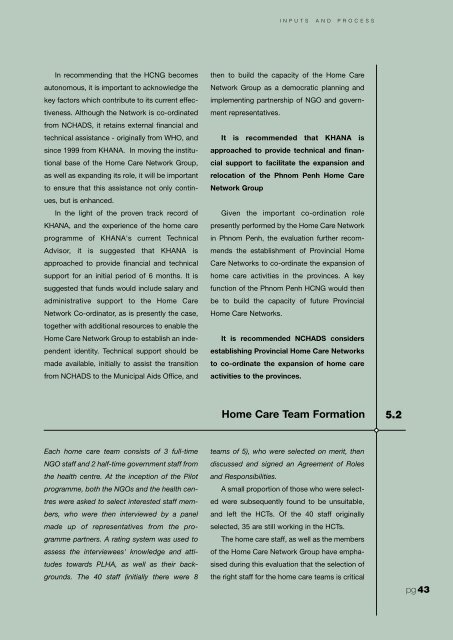PDF File - hivpolicy.org
PDF File - hivpolicy.org
PDF File - hivpolicy.org
- No tags were found...
You also want an ePaper? Increase the reach of your titles
YUMPU automatically turns print PDFs into web optimized ePapers that Google loves.
INPUTSAND PROCESSIn recommending that the HCNG becomesautonomous, it is important to acknowledge thekey factors which contribute to its current effectiveness.Although the Network is co-ordinatedfrom NCHADS, it retains external financial andtechnical assistance - originally from WHO, andsince 1999 from KHANA. In moving the institutionalbase of the Home Care Network Group,as well as expanding its role, it will be importantto ensure that this assistance not only continues,but is enhanced.In the light of the proven track record ofKHANA, and the experience of the home careprogramme of KHANA's current TechnicalAdvisor, it is suggested that KHANA isapproached to provide financial and technicalsupport for an initial period of 6 months. It issuggested that funds would include salary andadministrative support to the Home CareNetwork Co-ordinator, as is presently the case,together with additional resources to enable theHome Care Network Group to establish an independentidentity. Technical support should bemade available, initially to assist the transitionfrom NCHADS to the Municipal Aids Office, andthen to build the capacity of the Home CareNetwork Group as a democratic planning andimplementing partnership of NGO and governmentrepresentatives.It is recommended that KHANA isapproached to provide technical and financialsupport to facilitate the expansion andrelocation of the Phnom Penh Home CareNetwork GroupGiven the important co-ordination rolepresently performed by the Home Care Networkin Phnom Penh, the evaluation further recommendsthe establishment of Provincial HomeCare Networks to co-ordinate the expansion ofhome care activities in the provinces. A keyfunction of the Phnom Penh HCNG would thenbe to build the capacity of future ProvincialHome Care Networks.It is recommended NCHADS considersestablishing Provincial Home Care Networksto co-ordinate the expansion of home careactivities to the provinces.Home Care Team Formation 5.2Each home care team consists of 3 full-timeNGO staff and 2 half-time government staff fromthe health centre. At the inception of the Pilotprogramme, both the NGOs and the health centreswere asked to select interested staff members,who were then interviewed by a panelmade up of representatives from the programmepartners. A rating system was used toassess the interviewees' knowledge and attitudestowards PLHA, as well as their backgrounds.The 40 staff (initially there were 8teams of 5), who were selected on merit, thendiscussed and signed an Agreement of Rolesand Responsibilities.A small proportion of those who were selectedwere subsequently found to be unsuitable,and left the HCTs. Of the 40 staff originallyselected, 35 are still working in the HCTs.The home care staff, as well as the membersof the Home Care Network Group have emphasisedduring this evaluation that the selection ofthe right staff for the home care teams is criticalpg 43
















